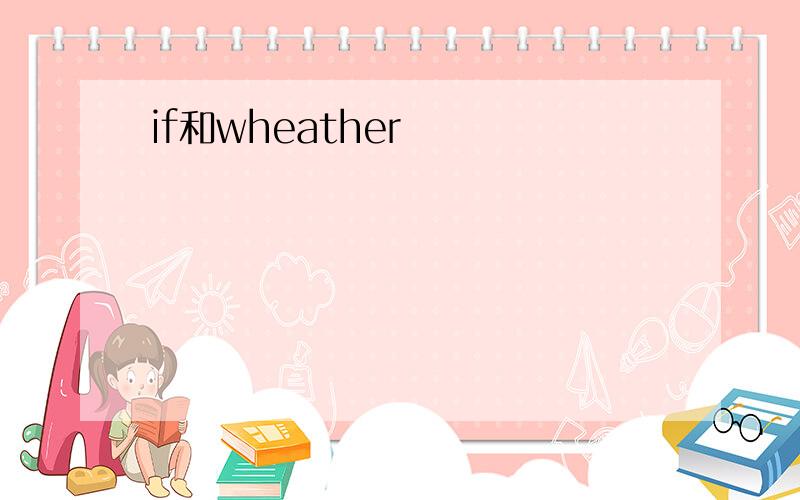if和wheather
来源:学生作业帮 编辑:神马作文网作业帮 分类:英语作业 时间:2024/11/18 23:08:18
if和wheather的所有用法,及相同于不同之处 特别是在间接与直接引语中的用法

解题思路: 如下
解题过程:
把一般疑问句变为间接引语时,由whether或if引导,表示不肯定或疑问,意为“是否”“是不是”“能否”等,if和whether一般可以互换。句尾的标点符号取决于主句。
Tom didn’t know if/whether his grandpa liked the present.
汤姆不知道他的爷爷是否喜欢这个礼物。
Could you please tell me if/whether there are any good museums around here?
请告诉我附近是否有好的博物馆好吗?
小提示:
在下面几种情况下只能用whether:
1. 从句中有or not出现时。
I don’t know whether or not she can arrive on time. 我不知道她是否会准时到达。
2. 宾语从句放在句首时。
Whether he will succeed, we can’t say. 他是否能成功,我们说不准。
3. 在介词的后面。
I’m thinking of whether we should go fishing. 我在想我们是否该去钓鱼。
if还可以引导条件状语从句,而whether不可以。
<一> 条件状语从句的含义
由一个主句和一个或一个以上的从句构成的句子叫复合句,在复合句中用作状语的从句叫做状语从句。状语从句根据它表达的意思可分为很多种,if引导的句子在复合句中表示条件,作主句的条件状语,因此称为条件状语从句。例如:
If you don’t hurry, you’ll be late. 如果你不抓紧时间,你会迟到的。
<二>if 引导的条件状语从句与主句时态的一致性
在复合句中,从句中的动词时态在一定程度上受到主句中动词时态的制约,英语语法中称为时态呼应。
1. 在含有条件状语从句的复合句中,如果主句是一般将来时,从句则用一般现在时代替一般将来时。例如:
If it rains, I will stay at home. 如果下雨,我将呆在家里。
I’ll go with you if you don’t want to go alone. 如果你不想一个人去我将陪你去。
2. 如果主句含有must, may, can 等情态动词,从句也要用一般现在时。例如:
If you drive too fast, you may have an accident. 如果你把车开得太快,你可能会出交通事故。
You must stop if the traffic is red. 如果红灯亮了,你必须停下来。
3. 如果主句是祈使句,从句同样要用一般现在时。例如:
Don’t go and play football if you don’t finish your homework. 如果你没完成家庭作业,就不要去踢足球。
最终答案:略
解题过程:
把一般疑问句变为间接引语时,由whether或if引导,表示不肯定或疑问,意为“是否”“是不是”“能否”等,if和whether一般可以互换。句尾的标点符号取决于主句。
Tom didn’t know if/whether his grandpa liked the present.
汤姆不知道他的爷爷是否喜欢这个礼物。
Could you please tell me if/whether there are any good museums around here?
请告诉我附近是否有好的博物馆好吗?
小提示:
在下面几种情况下只能用whether:
1. 从句中有or not出现时。
I don’t know whether or not she can arrive on time. 我不知道她是否会准时到达。
2. 宾语从句放在句首时。
Whether he will succeed, we can’t say. 他是否能成功,我们说不准。
3. 在介词的后面。
I’m thinking of whether we should go fishing. 我在想我们是否该去钓鱼。
if还可以引导条件状语从句,而whether不可以。
<一> 条件状语从句的含义
由一个主句和一个或一个以上的从句构成的句子叫复合句,在复合句中用作状语的从句叫做状语从句。状语从句根据它表达的意思可分为很多种,if引导的句子在复合句中表示条件,作主句的条件状语,因此称为条件状语从句。例如:
If you don’t hurry, you’ll be late. 如果你不抓紧时间,你会迟到的。
<二>if 引导的条件状语从句与主句时态的一致性
在复合句中,从句中的动词时态在一定程度上受到主句中动词时态的制约,英语语法中称为时态呼应。
1. 在含有条件状语从句的复合句中,如果主句是一般将来时,从句则用一般现在时代替一般将来时。例如:
If it rains, I will stay at home. 如果下雨,我将呆在家里。
I’ll go with you if you don’t want to go alone. 如果你不想一个人去我将陪你去。
2. 如果主句含有must, may, can 等情态动词,从句也要用一般现在时。例如:
If you drive too fast, you may have an accident. 如果你把车开得太快,你可能会出交通事故。
You must stop if the traffic is red. 如果红灯亮了,你必须停下来。
3. 如果主句是祈使句,从句同样要用一般现在时。例如:
Don’t go and play football if you don’t finish your homework. 如果你没完成家庭作业,就不要去踢足球。
最终答案:略
if和wheather
mother asked___Lucy heard___she said..if,what B wheather,tha
这句话中为什么不能用if?I do not know wheather he will come to our part
英语翻译wheather the weather is chilly or wheather the weather i
if else 和 if if 的区别
请问[what's the wheather like in your hometown?
the wheather in guangzhou is hotter than in harbin
what is the probability of accurately forecasting wheather e
Here is the Wheather forecast for Chinese New Year
同位语从句什么时候连接词用that,什么时候用wheather?
一道英语选择题选什么,是用what还是wheather
even if 和though